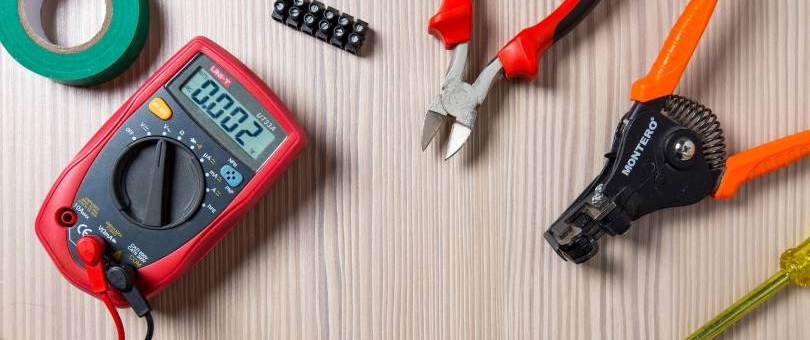‘DIYs’ have been trending for a very long time.
Many people love doing things themselves to save money.
Look up a DIY for anything and you’ll find it – whether it’s sparkling your bathroom tiles, cutting your hair, cleaning your own carpets, or painting your walls.
However, when you look up electrical DIYs, what do you find?
I’m sure you’ll find a few electrical tasks you can do yourself, but did you know that it is not only risky to do your own electrical work, but also illegal in most countries?
Now, you might wonder, “What’s the big deal about doing electrical work by yourself?”
Drawback of Electrical DIYs
You can surely do your own electrical work, and put your knowledge to a practical test.
However, if it leads to a fire, it’ll cost you more money it would have to simply hire an expert, apart from the property damage, and emotional and social loss.
Here’s when insurance comes into play, and guess what?
Your insurer will not cover for any of the damages caused due to the electrical work being illegal or unlicensed.
Why Electrical DIYs are Illegal?
If you’re changing your exhausted light bulb yourself, no one’s going to stop you there. The potential risks of doing this are not much, however, anything more is danger!
According to the Government of Iowa, performing electrical-related work without holding a license to practice is a legal offense.
That’s not all, you could also be jeopardising your insurance.
It could call upon unwanted hazards in case you aren’t doing it right as well as could be fatal in extreme cases.
There have been several incidences where people have fiddled with electric wires around their house with an intention to fix it and only realized that it caused more damage than they expected, not to their pockets alone but to their health of them and their loved ones.
So, keep your loved ones out of the danger-zone! Stay safe!
What Accounts for Illegal Electrical Work?
Manufacturing, constructing, installing, testing, maintaining, repairing, altering, removing, or replacing of electrical equipment are termed electric work, as per The National Electrical Code (NEC), U.S.
Several people go ahead with doing their own repairs on switch boards and cables.
Yet, many of these people also call for help from electricians for fixing damaged cables, light fittings, and switches after doing it themselves.
You should be wise and learn from the lessons of others.
5 Electrical Fixes You Shouldn’t Do
Beware of the following.
- Fixing switches.
- Fixing existing power points.
- Replacing light fixtures with a fan.
- Constructing an extension lead.
- Replacing a plug at the end of the lead.
Almost every other electrical accessory you need for in your house is readily available on the market and they’re not very expensive either.
However, it is important to note that despite purchasing these accessories is legal, fixing them yourself or by anyone not authorized with a license to perform electrical work, is illegal.
5 Electrical Repairs You Can Do
Remember that certain repairs of electrical appliances that are not pinned to the wall or directly connected with the wires in the wall can be performed by homeowners.
These repair include:
- Replacing drive belts in washing machines.
- Fitting or cutting AC units.
- Replacing switches of food processor.
- Replacing a light bulb with the power turned off.
- Replacing a like for a like without modifications or additions.
What Penalties You’d Face if You Break the Law?
It’s no surprise that those carrying out illegal electrical work without a license will have to face penalties.
Homeowners can be prey to stringent criminal penalties, in case they break the law. The penalty differs from place to place.
For instance, in New York (2011), you’d require to pay $500 for any electrical offense committed the first time and the amount also rises to around $5,000 if committed thrice.
Any offense more than thrice could also lead to the possibility of six months imprisonment and a fine.
How to Save Yourself From Penalties?
There’s no escape if you’ve completed some illegal electrical work.
But you can take some precautions.
3 Ways to Save Yourself From Penalties
1. Building Control Fee
Pay building control fee to avail for tests and repairs around the place.
2. Get Certified
You can perform electrical work in your house only if you are certified, and you do not have to be an electrician to get certified.
Yes, home owners can join self certification schemes.
You’ll have to take a ‘Homeowners Electrical Exam’, which will allow you to perform electrical work in your own home.
However, you are limited to performing only a few projects at home.
3. Hire a Licensed Electrician
Just as beneficial it can be to have a homeowner’s license to perform electrical work, it is still not enough due to the restricted array of tasks you can perform.
Thus, hiring a professional to get the job done is not just the last but also the best resort.
Finding a Licensed Electrician?
Licensed electricians can be easily found on white pages, yellow pages, and in local newspapers.
Or instead of investing a lot of your precious time in hunting for a good electrician, you could simply get in touch with an electrical industry association.
But Finding Made Simpler Now
There are several apps that help locate electricians near you, helping you make a right choice.
For instance, Same Day Pros provides you with a list of licensed electricians near you, making the task of finding a good electrician way easier.
So, the next time you need to fix electrical-related things around the house, you know what to do.
Especially keeping in mind that, being your own electrician without being certified is illegal, dangerous, and could be fatal too.
You can also follow Same Day Pros on Facebook and Twitter for some quick electrical advice.



[…] Why You Shouldn’t Do Your Own Electrical Work? […]